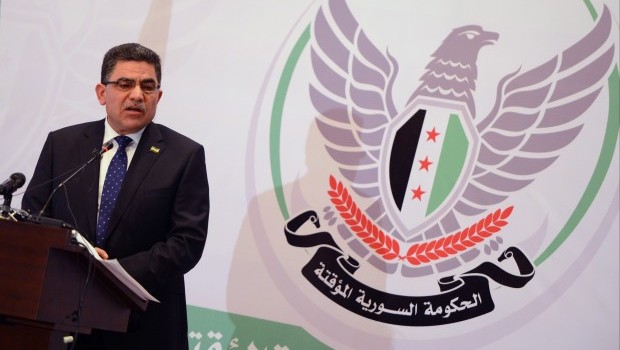Everyone is on their way to the Arab summit in Doha. For the kings and presidents in attendance, there will be nothing more pressing to discuss than the Syrian crisis and its humanitarian, political, and military repercussions for the country and the region. There is a seat for Syria at the Arab summit and a Syrian flag outside, and this time it is not Bashar Al-Assad who will attend, rather it is his opponents. However, the problem is that although there is a seat, the Syrian opposition cannot agree upon someone to sit in it.
While the Syrian National Coalition championed Ghassan Hitto from the hotel rooms of Doha, Colonel Riad Al-Asaad, a leader of the Free Syrian Army (FSA), almost lost his life in Deir Ezzor after the regime tried to assassinate him and, as a result, had his leg amputated.
When looking at it this way, one cannot compare the eligibility of those who risk their lives every second to make changes on the ground with the eligibility of those who argue during conferences over cabinet positions and coalition seats. A day before the explosion that targeted Asaad, the FSA issued a statement objecting to Hitto’s appointment. It stressed that it did not want to impose a particular name or leader, but insisted that the appointment must come with the consensus of all parties, not just the majority. Indeed, it is strange that the coalition nominated an interim prime minister without even bothering to ask the opinion of those who risk their lives on the ground, like the FSA and the Syrian Revolution General Commission (SRGC).
A few days ago, I wrote an article stating that the most important thing is that the Syrians take a steady path towards Damascus with the least amount of disputes over political issues. What I meant was that they must not go to places like Doha at odds with each other, which unfortunately is the case today. Here I would like to quote a veteran Syrian opposition figure, who effectively explained the nature of the problem to me. He said, “Mr. Hitto as a person is not the problem, and the objection is not that he is Kurdish. (Abdul Basit) Seda (a Kurd) had been nominated before. However, does it make sense that after two years of the revolution, not after two weeks or two months, we wake up in the morning at the hotel to be informed that someone named Ghassan Hitto has been assigned prime minister? Who is Hitto? How will we convince 25 million Syrians that we chose and recommended him for them? How will we explain to the Syrian people that after two years we could not find one single person they are familiar with, so we had to appoint someone they do not know and who was brought in from America, and we don’t even know if he is capable of leading or not?”
He went on to say, “We are confronting a wholly immoral enemy that aims to plant suspicion and sow division, and at the same time we are being held accountable by people who have suffered what one cannot even imagine. There is no single family that has not paid a high price in this revolution. How can we convince them that we have appointed a prime minister for them when we ourselves do not know him, and when they themselves have not seen him anywhere during the entire two years of the revolution? I am confident that Mr. Hitto is a respectable person who cares about Syria. But during this difficult time, we want a person who represents everyone and not only some Syrians. The majority of the Syrian National Coalition nominated Hitto but the coalition itself only represents some Syrians. Therefore, Hitto represents the majority of some! It is our right as individuals to disagree over ideas and means. Each one of us wants the best for the country, and most of us have been opposition figures for many long years. Haitham Al-Maleh spent 50 years imprisoned. Michel Kilo is a Christian who opposed Assad despite the regime courting his sect. Wahid Saqr is an Alawite who has joined the struggle with us since the beginning. Despite the threats made against him because of his origins, still he holds his ground.”
The veteran opposition figure concluded, “If issues are being dealt with like that—with a policy of imposing a de facto situation where we wake up in the morning and find out that a leader has been assigned despite our will—then we should be alarmed. We have to ask ourselves ‘why are we really fighting Bashar al-Assad’s regime?’ This entire revolution does not only intend to topple Assad. What is more important is that we establish a just system that all Syrians accept. It is not acceptable that Hitto be assigned without consulting those who sacrifice themselves. Who are we to impose a prime minister on the Syrian people? Not to mention that those who did so ignored all over Syrian opposition forces.”
The truth is that matters will be difficult in Syria until a consensus is reached.
